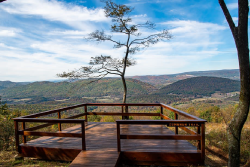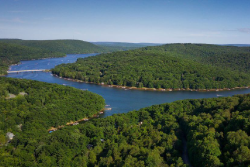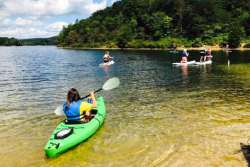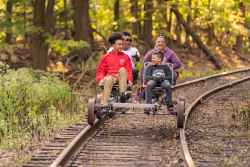
On November 15, 2021, President Biden signed the Bipartisan Infrastructure Law (BIL) — also called the Infrastructure Investment and Jobs Act (IIJA) — a once-in-a-generation investment in American infrastructure intended to make the economy more sustainable, resilient, and just. Within the BIL, ARC was allocated $1 billion dollars over five years, or $200 million annually, starting in Fiscal Year 2022.
Building Appalachia’s infrastructure has been an ARC investment priority for over 58 years, and the funding provided through the BIL has allowed ARC to enhance our support for critical projects. This includes helping two Appalachian Maryland counties expand outdoor recreation by attracting new businesses and more visitors.
Helping Businesses “Make it. In the Mountains.”
In 2019, a Maryland Outdoor Recreation Economic Commission study identified Cumberland, Maryland as the state’s ideal epicenter for an outdoor recreation economy. Ashli Workman, Director of Allegany County Tourism, quickly assembled a work group of partners from Allegany and Garrett Counties, as well as the State of Maryland Economic Development office, to put this idea into action. The work group’s mission was to use 70,000 square miles of public parks, forests, trails, and lakes to bolster economic development in Western Maryland.
In 2022, ARC awarded Allegany County $75,000 in BIL funding to help the work group take another step towards mission fulfillment. Funds were used to hire consultants for the development a Regional Strategic Plan for Business Attraction, including a marketing strategy to recruit and retain outdoor recreation manufacturing and lifestyle businesses to the area.
The marketing plan’s main message? “If you have a love of the outdoors and the business vision, come to Western Maryland and realize you have what it takes to… Make it. In the mountains.”



Embracing Existing Entrepreneurs and Educators
Allegany County had already seen a surge of new specialty food entrepreneurs, including coffee shops, ice creameries, wineries, breweries, and more. Consultants helped the work group identify additional industries to focus on, including timber and wood products, apparel, and outdoor vehicles. When recruiting businesses and entrepreneurs in these emerging industries, showcasing existing shops – and how they’ve thrived in the area – is key.
Additionally, Western Maryland has strong educational opportunities thanks to Allegany College of Maryland (ACM), Frostburg State University (FSU), and Garrett College. When the work group’s study indicated that workers would be needed for the growing outdoor industry, these partners stepped up to secure Economic Development Administration grants and expand training opportunities at their respective institutions.
At FSU, graduating students are placed in outdoor recreation businesses, can participate in an adventure retail program, or utilize a small business incubator on campus to gain experience in the outdoor rec sector. At both ACM and Garrett College, new programs in the outdoor rec field are offered to students, including adventure sports, marine mechanics, hospitality, and bicycle mechanics. These programs help the area’s college graduates not only connect with outdoor recreation careers, but also do so while making a home in the mountains of Maryland.



ARC is grateful to the Biden-Harris Administration for their historic investment to bolster infrastructure in America, which has allowed us to support important projects across Appalachia. Learn more about the BIL here.


